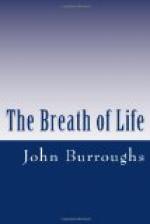If biogenesis is true, and always has been true,—no life without antecedent life,—then the question of a beginning is unthinkable. It is just as easy to think of a stick with only one end.
Such stanch materialists and mechanists as Haeckel and Verworn seem to have felt compelled, as a last resort, to postulate a psychic principle in nature, though of a low order. Haeckel says that most chemists and physicists will not hear a word about a “soul” in the atom. “In my opinion, however,” he says, “in order to explain the simplest physical and chemical processes, we must necessarily assume a low order of psychical activity among the homogeneous particles of plasm, rising a very little above that of the crystal.” In crystallization he sees a low degree of sensation and a little higher degree in the plasm.
Have we not in this rudimentary psychic principle which Haeckel ascribes to the atom a germ to start with that will ultimately give us the mind of man? With this spark, it seems to me, we can kindle a flame that will consume Haeckel’s whole mechanical theory of creation. Physical science is clear that the non-living or inorganic world was before the living or organic world, but that the latter in some mysterious way lay folded in the former. Science has for many years been making desperate efforts to awaken this slumbering life in its laboratories, but has not yet succeeded, and probably never will succeed. Life without antecedent life seems a biological impossibility. The theory of spontaneous generation is rejected by the philosophical mind, because our experience tells us that everything has its antecedent, and that there is and can be no end to the causal sequences.
Spencer believes that the organic and inorganic fade into each other by insensible gradations—that no line can be drawn between them so that one can say, on this side is the organic, on that the inorganic. In other words, he says it is not necessary for us to think of an absolute commencement of organic life, or of a first organism—organic matter was not produced all at once, but was reached through steps or gradations. Yet it puzzles one to see how there can be any gradations or degrees between being and not being. Can there be any halfway house between something and nothing?
II
There is another way out of the difficulty that besets our rational faculties in their efforts to solve this question, and that is the audacious way of Henri Bergson in his “Creative Evolution.” It is to deny any validity to the conclusion of our logical faculties upon this subject. Our intellect, Bergson says, cannot grasp the true nature of life, nor the meaning of the evolutionary movement. With the emphasis of italics he repeats that “the intellect is characterized by a natural inability to comprehend life.” He says this in a good many pages and in a good many different ways;




